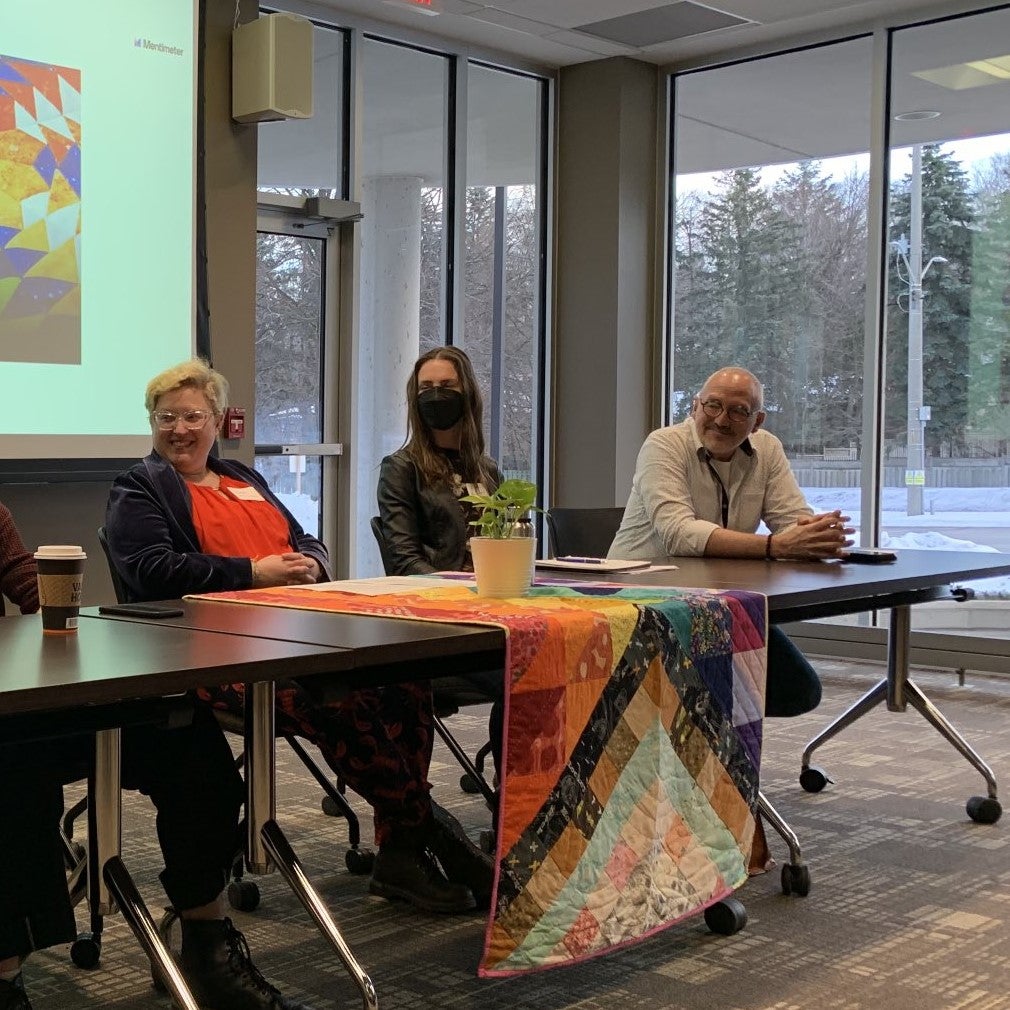The Affirming Power of PIE

Pi Day is a day where math lovers and pie enthusiasts come together. But Pi Day is more than just an excuse to eat pie—March 14 is also recognized as National Affirming Day, or PIE Day.
Co-founded by Affirm United/S’affirmer Ensemble and Affirming Connections, PIE Day sets the standards of being Public, Intentional, and Explicit when working toward being affirming, welcoming, and inclusive, particularly of 2SLGBTQIA+ identities in religious and church communities.
On March 15, the Theological Studies Department, and the Chapel Committee at Conrad Grebel University College celebrated PIE Day. The evening included a chapel service, a panel discussion on the topic of "Christianity and Queerness" with local pastors and students, and ended with a reception where staff, panelists, and students came together to engage in insightful conversation and eat a variety of delicious pies.
The panel began with a written greeting by President Marcus Shantz. “I would like to be public, intentional, and explicit about thanking those who have spent years and decades advocating for full inclusion and belonging in Mennonite churches and the wider community,” he wrote.
Panelists had a connection to both Christianity and the queer experience, and the intersection of those identities. The first panelist was a University of Waterloo student involved in Grebel’s 2SLGBTQIA+ club, Queer, Allies, and Questioning (QuAQ). The second panelist was Steph Chandler-Burns, who earned a Master of Theological Studies (MTS) from Grebel in 2017, one of the founders of QuAQ, and now a local pastor. The third panelist was Kim Penner, a pastor who earned an MTS degree from Grebel in 2011 and a PhD in 2017 from St. Michael’s College in sexual ethics from a Christian feminist perspective. The fourth panelist was Pieter Niemeyer, a pastor, husband, and father who came out 10 years ago. He connected with Grebel in his past work as a Mennonite Church Eastern Canada pastor.
The event served as an opportunity to learn and grow together, regardless of initial perspectives going into the conversation. To make learning accessible and to create a safe space to be curious, the panel allowed attendees to ask questions anonymously through a digital platform.
The panelists offered the generous gift of sharing what they have learned from their lived experiences and using that wisdom to respond to questions about situations that can be difficult, confusing, and hard to navigate. “Having conversations on the topic of Christianity and queerness can be very intellectual and theoretical, but it is important to remember it is also personal— it is at the core of my identity. Do I belong? Do people think I am loved by God? Is there a space for me?” shared Kim Penner.
Topics discussed ranged from interpreting scriptures, engaging in tough conversations where it feels as though one is defending their identity, supporting and extending grace to peers and friends, finding religious communities that accept and affirm 2SLGBTQIA+ identities, and having faith in the strength of love and resilience.
“My religious identity is as important to me as it is to a lot of people here,” said the first panelist. “You can acknowledge that you are a queer person and a religious person, and those things work for you. Hopefully to a great degree, because you deserve that,” they affirmed.
“The more I’ve embraced being queer, I have found that my faith has been stronger,” said Steph. “I found a space where I could ask questions like, ‘What does it mean that God loves me the way I am?’ It became clear that queer people have something important to offer the church.”
At its core, the event centered on affirmation and understanding the power of relatability. Grebel strives to move in this direction by strengthening the culture of inclusion and belonging. This means encouraging students to think beyond their own experiences, which includes courses in all Grebel programs. This spring, the Theological Studies department is offering a course on “Theology from the Margins” taught by Melanie Kampen, who is queer, neurodivergent, and whose research is at the intersections of feminist theologies, Christian ethics, and critical social theories.
“The tremendous value of affirmation can be a lifeline for those who need to hear it,” said Pieter. “It can lead to transformation and change, as it did for me.”
By Farah Jurdi